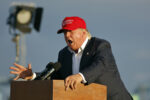Democratic MSNBC panelists sharply criticized Senator Cory Booker on Wednesday, July 30, following his confrontational behavior on the Senate floor, characterizing his actions as political theater designed to boost his public profile rather than achieve substantive legislative outcomes.
The criticism from “Morning Joe” panelists came after Booker accused fellow Democratic senators on Tuesday of aligning themselves with President Donald Trump over new police legislation. The New Jersey senator argued that without amendments, the legislation would allow the president to pick winners and losers regarding who receives benefits from the grants.
Booker characterized Democratic support for the legislation as complicity with what he termed an authoritarian leader who is trashing the country. He emphasized that it was time for Democrats to have a backbone and fight, particularly when it comes to his state’s safety being denied these grants.
MSNBC contributor Mike Barnicle responded dismissively to Booker’s Senate floor performance on Wednesday morning. Barnicle described it as great theater, noting that Booker was yelling at two other Democrats. He expressed confusion about why Booker was targeting fellow party members when Democrats already face significant challenges in defining themselves to the public and demonstrating their commitment to solving problems.
Former Democratic Senator Claire McCaskill, now an MSNBC analyst, provided a more detailed analysis of Booker’s motivations. She explained that the Democratic base is starving for a fighter and wants people to fight Trump because everyone is frustrated, angry, and depressed at everything he is doing and how he is doing it. McCaskill also referenced what she characterized as cowardice from Republicans across the aisle in the Senate who are casting votes she never would have expected during her time serving with them.
However, McCaskill defended Democrats like Senator Amy Klobuchar of Minnesota as strong legislators doing everything they can to fight Trump under the current administration. She criticized Booker for unfairly targeting these colleagues, noting that there is a proper way to change legislation and another way to secure prominent media coverage.
McCaskill suggested that Booker chose the latter approach, knowing his actions would create a viral moment and associate him with Democrats willing to fight. “He knew if he did this, it would be a viral moment, and he would be associated with Democrats who are willing to fight,” she indicated, emphasizing that the bill did not actually impact funding and there likely was not sufficient leverage to defy Trump, given the lack of votes in the Senate.
The former senator expressed particular concern about Booker’s approach to criticizing colleagues. She characterized his criticism of fellow Democrats as unusual and unheard of, describing it as worrisome given the fights the Democratic Party needs to wage in next year’s midterm elections.
McCaskill emphasized that Booker understands the mathematical reality that Democrats lack the votes in the Senate to accomplish what the base wants them to do. She noted that this makes his public criticism of colleagues particularly problematic from a strategic standpoint.
The MSNBC segment highlighted tensions within the Democratic Party between members seeking to work within existing political constraints and those pushing for more confrontational approaches. The panelists suggested that while Democratic voters may be seeking more aggressive opposition to the Trump administration, internal party conflicts could undermine broader strategic objectives.
Booker has previously engaged in high-profile Senate floor demonstrations, including what was reported as a record 25-hour speech against Trump and Elon Musk. These theatrical moments have drawn both praise from progressive activists and criticism from those who question their effectiveness in achieving policy goals.
The “Morning Joe” criticism reflects broader debates within Democratic circles about the most effective ways to oppose the Trump administration’s policies while maintaining party unity. Some argue for strategic collaboration where possible, while others advocate for more confrontational resistance tactics.
The police legislation at the center of Booker’s outburst represents one of many policy battles where Democrats must decide whether to work within the existing framework or adopt more oppositional stances that may appeal to their base but potentially limit their legislative effectiveness.








